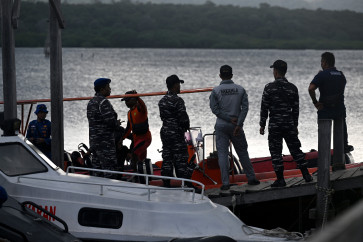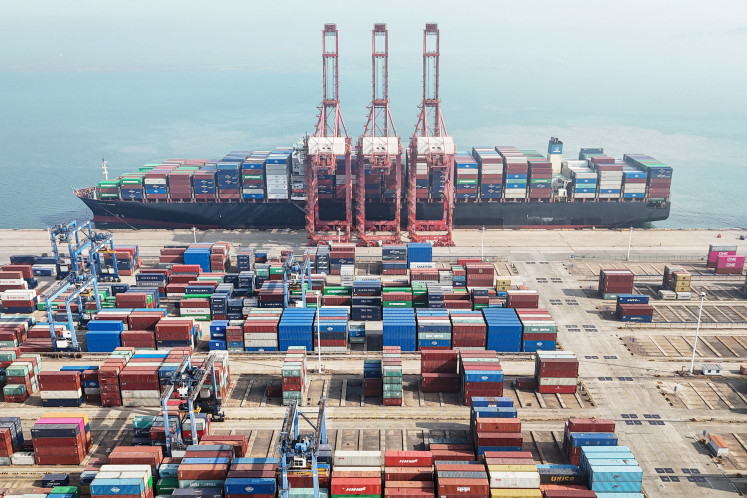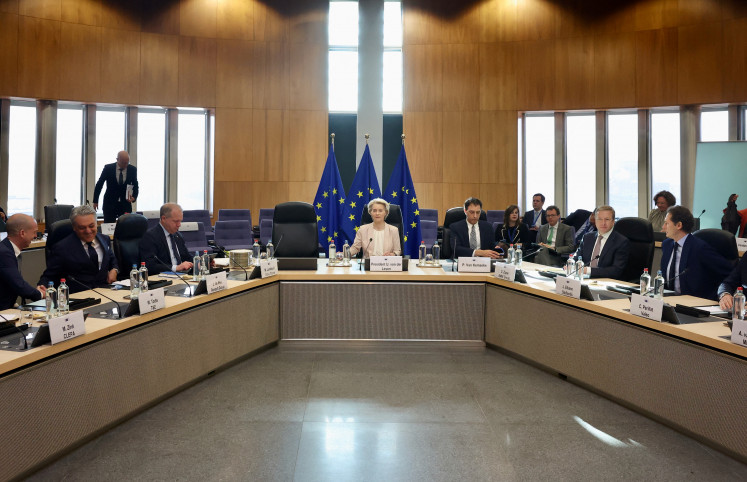Popular Reads
Top Results
Can't find what you're looking for?
View all search resultsPopular Reads
Top Results
Can't find what you're looking for?
View all search resultsIndonesia’s for-profit conservationists
Running alongside the eastern border of Kalimantan’s Tanjung Puting National Park is a broad expanse of oil palm plantation
Change text size
Gift Premium Articles
to Anyone
R
unning alongside the eastern border of Kalimantan’s Tanjung Puting National Park is a broad expanse of oil palm plantation.
The tropical rainforest teeming with various tree species and swinging orangutans would jut up against the endless rows of mono-cultured oil palms if not for a 91,000-hectare swath of privately owned land separating the park and plantation.
This land too has prime plantation potential. Instead, businessman Eka Ginting has preserved its natural environment to contain an orangutan sanctuary.
Eka is no diehard environmentalist willing to forgo vast profits to save a bunch of primates and conserve biodiversity. He hails from a family with investments in extractive industries and is one of a growing number of hardheaded Indonesian businessmen seeking profits through conservation work. For Eka, “conservation is a for-profit activity.”
With his company PT Rimba Raya, Eka hopes to sell the carbon trapped in the plants and soil that would otherwise have been released into the atmosphere if he developed the land. The revenues, according to Eka’s calculations, will more than offset the opportunity costs of plantations forgone.
“Some areas, such as deep swamp forest in our concession area, have value even if conserved,” he says.
Another Indonesian company, PT Rimba Makmur Utama, bought a forest lot in Kalimantan three times the size of Singapore. Instead of developing lucrative oil palm plantations here, the Jakarta-based company has designated the land an “Ecosystem Restoration Concession” worth reforesting.
These are just two of 240 carbon reduction projects in the country, according to a presentation by Dicky Hindarto who heads the United Nation’s Designated National Authority on cap and trade projects in Indonesia. Nineteen of the projects — which include conserved forest lots, hydropower dams, public transportation projects and facilities that recycle or convert waste to power — are already registered.
In 2011, these 19 generated 5.3 million Carbon Emission Reduction credits, each representing a ton of carbon dioxide.
Businessmen like Eka see the conservation of land to produce carbon credits as a growth industry in Indonesia.
However, at the end of this year, four-fifths of the world’s carbon markets will lose their legal basis if world leaders don’t recommit to the Kyoto Protocol — a global treaty on emissions reductions signed in 1997.
Who will sign on, for how long and how much carbon they will commit to cutting are some of the decisions policymakers are expected to make at the Climate Convention coming up in Doha this week. If they fail, what might a period without markets bound by international treaty mean for carbon investments and market growth in Indonesia?
According to Eka, the impact will be minimal in the short-term, even if world carbon markets go through a lapse of unregulated uncertainty. Currently, Indonesia’s supply of credits is low enough to be absorbed by voluntary carbon markets unaffected by the Kyoto Protocol’s expiration.
These voluntary markets mainly serve North American entities that are not bounded by Kyoto’s strictures since their countries never signed the treaty. Such “voluntary” purchases comprised barely 1 percent of global certified emission reduction credit sales in 2011, according to World Bank figures. But that small segment of the global market is still plenty to absorb all of Indonesia’s carbon sequestration projects.
The long-term prospect is not so sanguine, though, warns Agus Sari. Agus heads a task force to chart Indonesia’s response to a UN mandate for Reducing Emissions from Deforestation and Forest Degradation (REDD). Agus thinks the fate of Indonesia’s carbon market will be shaped by two documents that will be discussed in Doha.
REDD+ and the Kyoto Protocol are “the basis of the carbon market”, Agus said. If emission commitments agreed to in Doha are too meager, the demand for carbon credits will be lower than supply and “the market will be flooded [and crash]”.
That’s a realistic scenario, but Agus is still hopeful that Indonesia, with its ecological comparative advantage, could weather such a downturn.
In 2007, the UN REDD mandate was expanded to REDD+ as a way to create “livelihood alternatives … in local development plans; transparency, democratic access to forest resources, [and] genuine participation of multiple stakeholders.” Indonesia is exceptionally well endowed for this expanded mission, Agus’s task force notes in a brochure touting itself as a “catalyst for change”.
The brochure goes on to list the conservation opportunities inherent in the country’s unique ecosystems: 100 million hectares of dense tropical canopy; “almost 50 percent of the total mangrove area in Asia”; and the 168 gigatons of carbon dioxide stored in its peatlands.
But Agus’s optimism hinges on whether REDD credits are kept separate from carbon credits. To Agus, it makes sense to keep the two markets separate, since “they were created for different purposes. One is about emission reductions and the other deals with offsets.” REDD was conceived expressly to reduce the carbon footprint of countries such as Indonesia and Brazil, the bulk of whose contribution to global emissions comes from deforestation.
Kyoto, on the other hand, aimed to create a “cap and trade” market to mediate between industrialized and developing countries. Each country would agree to “cap” its carbon emissions at a set level. Any over-runs could be “offset” by trading carbon credits with a developing country that fell short of its “cap”.
Agus advocates that REDD credits (if and when they become a reality) exist in a separate market. In the meantime, “cap and trade” has something to offer Indonesia, Agus concedes. But he thinks the concept could be more usefully applied domestically, rather than internationally.
That way Indonesia’s carbon investment would depend less on the economic health of other countries and would stabilize the budding conservation market.
Agus’s soaring vision for the future goes beyond cap and trade. He urges Indonesian concession holders to see beyond mere carbon sequestration. “Water, biodiversity, ecotourism, these are things that can be capitalized. If we just focus on carbon, we ignore these other values.”










